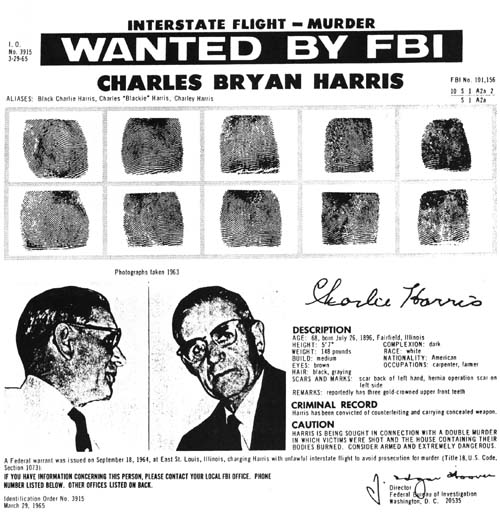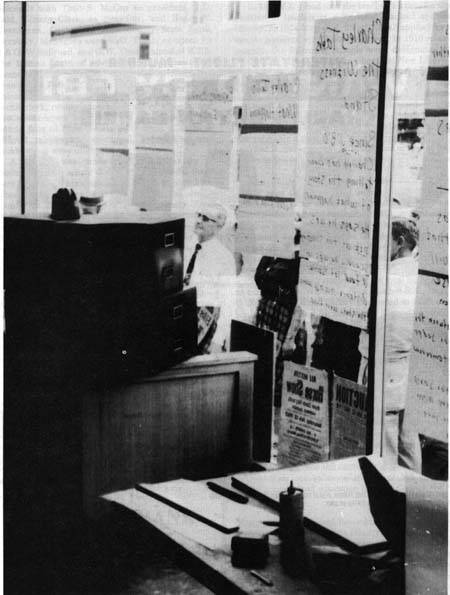|
|
|
|
. |
Gary DeNeal Polite, meticulous, full of years, full of laughter, full of stories big on mistakes, false friends and hairbreath escapes -this is how I remember Charles Bryan "Blackie" Harris. Others, with good reason, saw him as a killer cold-blooded enough to make icicles jealous. Modestly assessing his turbulent career for a newspaper reporter, Harris once said he was "the most overrated gangster in the world," and probably said it with sincerity enough to disarm a cynic, especially if that cynic had not read a southern Illinois newspaper for the last 40 years. "I'm not saying I did and I'm not saying I didn't," Charlie replied the first time I asked if he had really killed former friend and fellow gangster Carl Shelton back in 1947. Now it was 1977 and we were sitting in the cafeteria of the Vienna Minimum Security Prison where Harris was serving time for the 1964 murders of Betty Newton and Jerry Merritt. A year or so after that conversation he did add some details concerning Shelton's death. "Carl died in an ambush that was staged by himself ... and bodyguard Ray Walker for the purpose of murdering me. (Later) I was picked up in Oklahoma for Carl Shelton's murder in that ambush. Bennie Blades, highway patrolman and a Wayne City native, propositioned Sheriff Hal Bradshaw to deputize him to return me from Oklahoma. Blades had a deal with Bernie Shelton to stage an ambush in which I would be murdered. Hal did not buy that so Hal and Clacy Robbins came and got me." As for Bernie Shelton's death by sniper in Peoria in 1948, he denied any part in it, claiming he was back in Wayne County at the time. And besides, the two had played on a wagon tongue when they and the century were young, the obvious conclusion being 'Now who would shoot a boyhood chum?' That was Charlie's way, always bringing in a homey incident to sidetrack anyone prying for information. Harris attended church services at the prison, but more to help out the minister than to save his own soul. Not a particularly bookish sort, outside of going through law books looking for loop holes, he had dipped into the New Testament just enough to have serious doubts about the Almighty. "If there is a God, he's not doing anything," he complained. "I have been sincere in my wishes for something to point the way, to convince me, but all we've got is some writing from old senile SOBs. Old Khomeini reminds me of those apostles." As best Charlie could figure, life didn't venture beyond the grave. Whether he changed his mind or not in later years I do not know. And speaking of the grave, he had the quaint notion that killing a man was actually letting him off easy. "If you really want to hurt somebody," he said, "hurt him bad enough so he has to think about you every time he wakes up and feels the pain. " That he laughed a little took some of the edge off the remark. He had been stabbed at least twice and shot more times than that, but unlike old pal from Leavenworth days, Riley "Alabama" Simmons who once unbuttoned his shirt from the bottom to show me a bullet wound round as a sun and radiating ray-like stitch marks, Charlie was too much the country gentleman to footnote his anecdotes with scars. Still the ladies' man even in his 80s, he lamented that confinement had robbed him of a sex life. "It would be nice to have a furlough now and then," he said wistfully. Following Charlie's release from prison in 1980 we exchanged a few letters. In one he commented on some of the characters in my book, A Knight of Another Sort: Prohibition Days and Charlie Birger: "With the one exception, Mrs. Price and unborn baby, they were a worthless lot. But life to them was just as sweet as to the executioners .... Someone may write the same of me." Two more glimpses are in order. One time when "Big Earl" Shelton came back to Fairfield for a visit, The Wayne County Press gave him quite a write-up. Someone at the prison saw the article, showed it to Charlie, and quipped, "Look, here's one that got away. " The old prisoner was amused. One day for no apparent reason he looked it me across the table and said, "Remember, your best friend today could be your worst enemy tomorrow." Spoken with not so much as a smile, those eleven words told the tragic life story of Charles Bryan "Blackie" Harris, 1896-1988.
|
|
|
|




